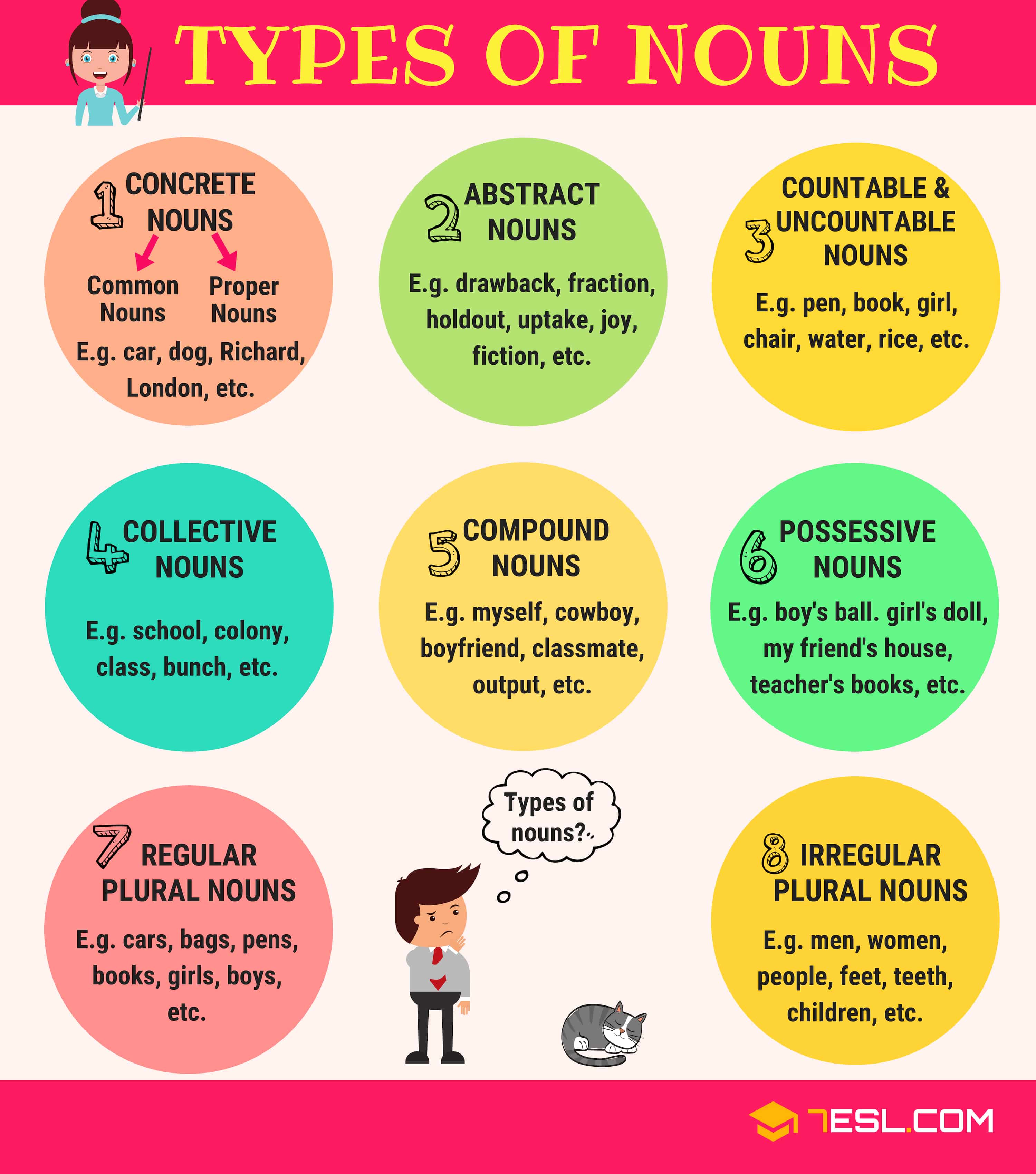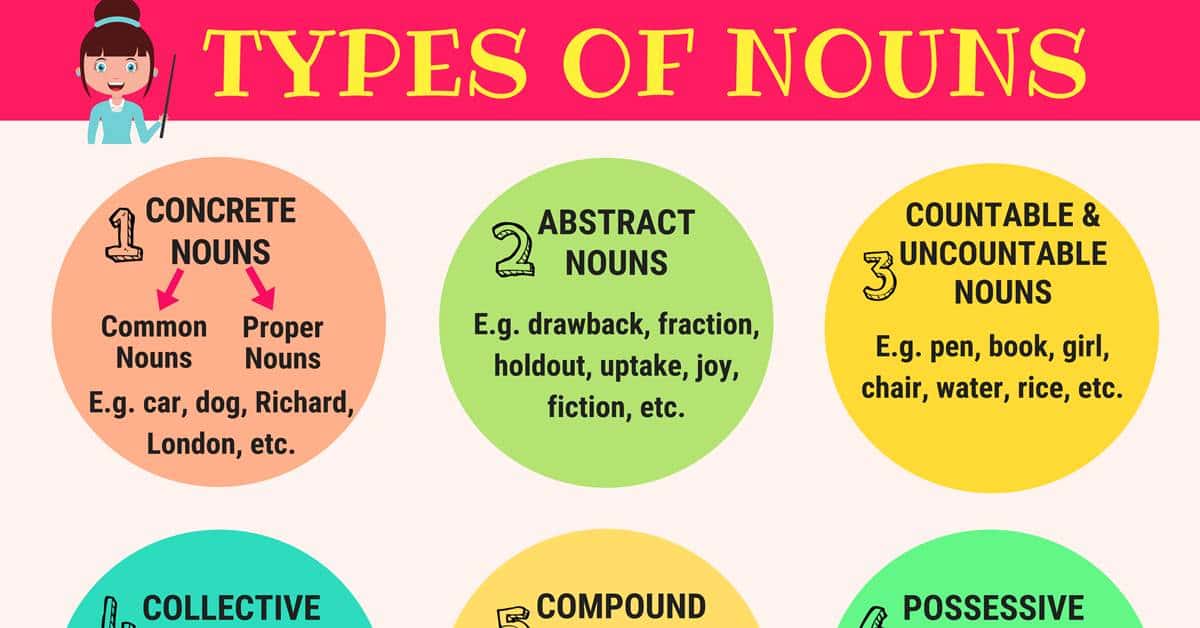What are the different types of nouns in English grammar? You don’t know? Well, I’ll explain it to you. In this article, you will learn the various noun types and you will be given examples for each of them. When you are studying the nouns in the Standard American English language, you will have probably noticed that these types of words fall into several smaller subcategories.
Understanding the different types of nouns and what they are used for will allow you to use them correctly in your written and spoken language. Learning to use these nouns properly will give you the confidence to speak them as well as further your understanding of English grammar. In this article, you will also find examples of each noun as well as sentences to help you better understand the concepts.
Types of Nouns
We are going to be looking at the various types of nouns as well as what they are used for. This will give you the confidence in using them as well as furthering your understanding of English grammar.
A noun is a word used to describe a person, place, thing, or idea. It is the most valuable part of speech in the English language. In a properly structured sentence, a noun can perform the function of the indirect object, direct object, object complement, subject complement, appositive, subject, or adjective.
Why are nouns important?
Nouns are arguably the most important part of speech in American Standard English. Nouns make up essentially all of the objects, people, and ideas that surround us in our everyday lives. Without nouns, we would not be able to communicate effectively with those around us. Nouns often answer questions such as “who”, “what”, or “when”.
Concrete Nouns
Concrete nouns are people, places, or things that we can experience with our five senses (taste, touch, sight, hearing, or smell). They are tangible, unlike ideas or thoughts, which are abstract nouns. They can be singular, plural; and proper, or improper. If you are unsure if a word is a concrete noun ask yourself the following questions: Can you touch it? Can you hold it? Can you see it? Is it tangible? Can you smell it?
Examples:
- Cake
- Dog
- Smoke
- Light
- Fire
- Book
- Umbrella
- Brother
- Aunt
- Oxygen
Sentence Examples:
- Daniel and his brother pretended to be pirates while playing inside of their father’s boat.
- The teacher handed out the textbooks to all of her high school students.
- William and his sister loved to ride their bikes through the neighborhood with their friends during the summer.
Concrete nouns can be divided into common nouns and proper nouns.
Common Nouns
Common nouns are the opposites of the proper nouns. It is not anything, person, or place, in particular. They do not need to be capitalized unless they are the first word of a sentence.
Examples:
- Woman
- Car
- Restaurant
- House
- Building
- Girl
- Boy
- Cousin
- Frog
- Chair
Sentence Examples:
- Daniel loves to play football with his brother after school.
- The music professor taught all of her students to read notes within a month of them signing up for piano lessons.
- Hannah and her sister drove to the movie theatre to meet their friends.
Proper Nouns
A proper noun is any noun that refers to a specific thing, person, organization, corporation, team, or place. Proper nouns are to always be capitalized, whether or not they are used at the beginning of a sentence.
Examples:
- Nancy
- Toyota
- McDonald’s
- Walmart
- Robert
- Ford
- William
- Gucci
- Armani
Sentence Examples:
- My mother’s favorite grocery to visit was Kroger because they offer more coupons than any other grocery store.
- Mrs. Harvey asked the children whether they preferred to use Google or Bing as their default search engine.
- In the fall, Amelia will begin college at the University of Hampton Hill, in Hampton, California.
Abstract Nouns
Abstract nouns are unlike concrete nouns. Abstract nouns refer to abstract objects such as ideas, thoughts, or concepts that can not be seen, felt, or held. They can be experienced or directed towards someone or something, however, they are not tangible. They include qualities that we cannot taste, feel, see, or smell. If you are unsure if a word is an abstract noun ask yourself the following questions: Can you touch it? Can you hold it? Can you see it? Is it tangible? Can you smell it? Is it something that is formulated in the mind or heart? Is it an emotion?
Examples:
- Love
- Hate
- Fear
- Joy
- Depression
- Sadness
- Sympathy
- Apathy
- Excitement
- Freedom
Sentence Examples:
- Randy could no longer hide the feeling of hatred that he had towards his brother.
- Bradley had a strong feeling of excitement when his sister was accepted into her dream college.
- My best friend, Alice, always had brilliant ideas for our community volunteer programs at the county library.
Collective Nouns
Collective nouns are a specific group of nouns that refer to groups that are made up of more than one individual or item.
Examples:
- Tribe
- Family
- Team
- Class
- Jury
- Board (In reference to an assembly of people appointed as the decision-making group of an association.)
- Flock
- Bouquet
- Forrest
- Herd
Sentence Examples:
- After a little encouragement from her sister, Lauren decided to join the school’s swim team.
- In science class, we watched an interesting documentary about animals that travel in herds.
- Raya’s boyfriend bought a bouquet of flowers to give to her before her date.
Compound Nouns
The majority of English compound nouns include phrases that are composed of a noun modified by adjectives or another noun. They ordinarily are made up of more than two other words that can be constructed by joining two words at one time. Combining “mother”, “in”, and “law”, for example, can result in the compound “mother-in-law”.
Examples (Hyphenated)
- Daughter-in-law
- Long-term
- Merry-go-round
- Mother-in-law
- Up-to-date
- Check-in
- Sign-up
- Forty-seven
- Two-fold
- Non-toxic
Examples (Not Hyphenated)
- Toothpaste
- Ice cream
- Sunflower
- Backdrop
- Blueberry
- Airport
- Cartwheel
- Firefly
- Airplane
- Paycheck
Sentence Examples:
- The unbelieving judges overestimated the skills of the young competitor in the gymnastics competition.
- The infamous legend of John Henry follows the stirring story of a Black man who worked on the railroad and was able to build the tracks faster than a machine.
- Today, Genny’s grandfather turned seventy-nine years old, and they celebrated with a family gathering.
Possessive Nouns
A possessive noun is a noun that names who or what owns or has possession of something. In most cases, for singular nouns to show that possession, we add an apostrophe and the letter “s”. When making a pronoun possessive, however, you will not need to add the apostrophe.
Examples (Regular Nouns)
- Lucy’s
- The boy’s
- The Teacher’s
- Samantha’s
- Drew’s
- The store’s
- The team’s
- My mother’s
- Her brother’s
- Our child’s
Examples (Possessive Pronouns)
- Hers
- His
- Theirs
- Mine
- Ours
- Everyone’s
- My
- Your
Sentence Examples:
- Ruby’s favorite subject in school was history, so she enjoyed weekend trips to the historical museums.
- The smiling parents were proud of their children because they knew that they had done their best.
- Mr. Lancaster made sure to remember everyone’s names at the beginning of the school year.
Regular Plural Nouns
Learn how to form regular plural nouns in English with examples.
- Most singular nouns are made plural by adding -s to the end of the singular form.
- When a noun ends in a sibilant sound – /s/, /z/, /ʃ/, /ʒ/, /tʃ/ or /dʒ/ – the plural is formed by adding -es, or -s if the singular already ends in -e.
- The plural form of some nouns that end in ‘f’ or ‘fe’ is made by changing the ending to -V(es).
- When a noun ends in “o” preceded by a consonant, the plural in many cases is spelled by adding -es.
- Nouns that end in ‘o’ preceded by a vowel are made plural by adding -s.
- When the ‘y’ follows a consonant, changing ‘y’ to ‘i’ and adding -es.
- When the ‘y’ follows a vowel, the plural is formed by retaining the ‘y’ and adding -s.
Irregular Plural Nouns
Learn the difference between plural and singular nouns; and different ways to form Irregular Plural Nouns in English.
Countable Nouns
Countable nouns are simply nouns that have the ability to become plural and/or be counted. Singularly, they will most likely be preceded by the words “a” or “an”. The vast majority of nouns in the English language fall into the classification of countable nouns.
Examples:
- Animals
- People
- Houses
- Toys
- Pebbles
- Windows
- Years
- Clothes
- Cars
- Flowers
Sentence Examples:
- The elderly farmer’s son decided to take care of cows, chickens, goats, and sheep that his father left behind.
- Khalil and Yara, a recently married couple, decided to search for newly renovated houses in four different neighborhoods.
- It took eight years for Fatima to earn her doctorate degree.
Uncountable Nouns
Uncountable nouns are simply nouns that do not have the ability to become plural and/or be counted.
Countable and Uncountable nouns vary from language to language. In some languages, there are no countable nouns. In addition, some nouns that are uncountable in English may be countable in other languages.
Examples:
- Furniture
- Milk
- Water
- Rain
- Light
- Stress
- Anger
- Sand
- Music
- Love
Sentence Examples:
- My cousin helped me move the furniture into my new apartment.
- Louis spilled juice on my new sofa, yesterday.
- The screaming children only added to their mother’s stress.
Different Types of Nouns | Infographic

10 Types of Nouns in English with Examples









0 Comments